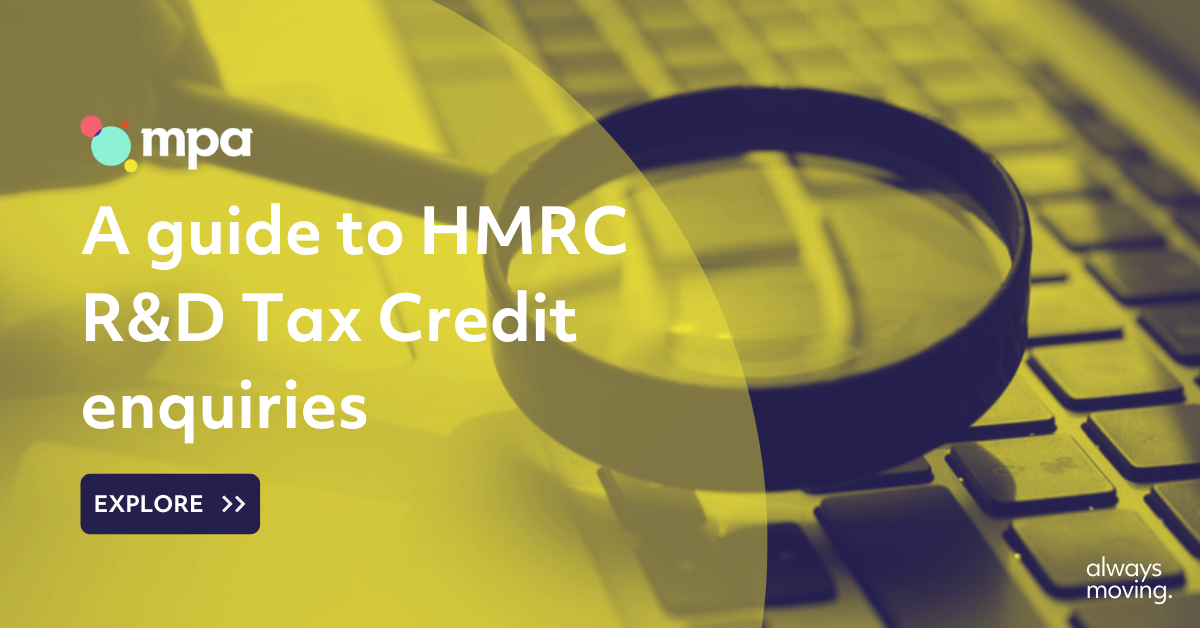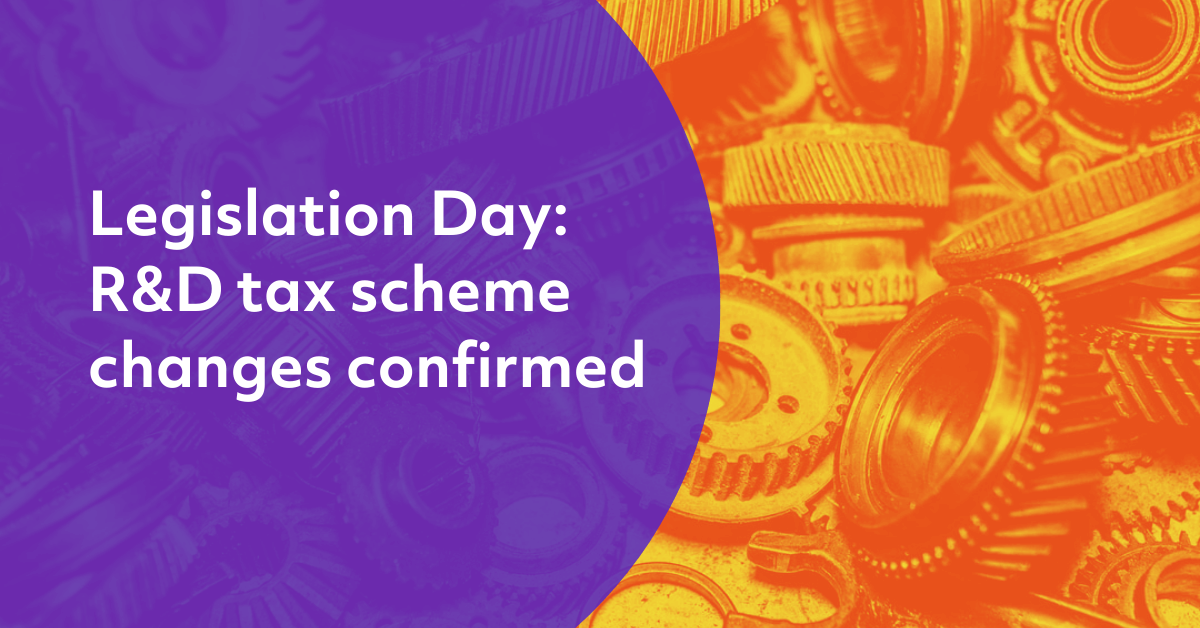Blog: R&D tax relief changes: everything you need to know
- R&D Tax Credits
- Knowledge Hub
- 10 Min Read
After several years of seemingly working harmoniously and as intended, R&D tax relief has become the latest tax policy to come under investigation by everyone from professional tax bodies to mainstream media.
Introduced by a Labour government in 2000, the scheme was designed to encourage businesses to invest in research and development, and to reward those genuinely advancing science or technology.
Twenty years later, a significant gap in the amount being paid out by the scheme and the amount of R&D investment being reported raised some significant flags – and kickstarted a whole series of changes.
An HM Treasury evaluation found that, while British companies claimed tax relief linked to £47.5 billion of research and development activity in 2019, the Office for National Statistics estimated that businesses only carried out £25.9 billion of privately financed research and development in Britain.
HMRC was asked to account for this gap by the House of Commons and they quickly pointed the finger at advisors who, it said, ‘approach businesses and suggest, incorrectly, that some expenditure can be recharacterised as R&D to get tax relief.’
From the 2020-21 HMRC Performance Report to the House of Commons Committee of Public Accounts:
HMRC explained that when it challenges a claim, it can find the advisor has gone and the business does not know a great deal about the rationale for the claim. HMRC confirmed that it had a watchlist of advisors that it was worried about. It said the list would be of great benefit to it when claimants are required to disclose who helped them with their claim.
During his time as Chancellor Rishi Sunak asked for an inquiry into the scheme to explore whether it did indeed support UK innovation, whether the definition and scope of qualification remained fit for purpose, and reviewing how the roles of HMRC, agents and businesses could be ‘improved’.
Off the back of this, three key changes to the R&D tax relief scheme were announced in the Autumn 2021 budget, set to come in from April 2023:
- The scope of qualifying expenditure was extended to include datasets, cloud computing and pure mathematics
- New limitations on what overseas work could be claimed for were added
- Anti-abuse measures were introduced that will see claims being made digitally, endorsed by a named senior official within the claiming company, and including details of agents or advisors used in compiling the claim. Time restrictions on new claimants was also introduced
The removal of overseas spending from claims, in particular, was disappointing, but advisors and claimants alike were just about getting their heads around the consequences of this announcement – and it does, at least, support the ‘investing in Britain’ narrative that government has been pushing.
Since the last Autumn Budget, though, headlines have continued to focus on alleged fraud within the scheme, so now more changes are incoming.
An investigation by The Times newspaper revealed that companies have allegedly claimed tax breaks for dubious ‘innovations’ like introducing vegan menus and adjusting washing machine temperatures, with evidence claiming that advisors were the ones encouraging this misuse.
The investigation suggested some advisors were boasting that HMRC “almost never checks” claims and that they can represent “free money” for companies. While this isn’t the experience of MPA – compliance checks can and are conducted for any number of reasons, including at random, so no experienced advisor would claim they never get checked. Perhaps some newer advisors have been ‘lucky’.
On the HMRC side of things, moves were being made to tackle this to some extent. Over the summer they delayed payment of R&D claims specifically to buy itself more time to review them; its usual 28-day turnaround time was extended to 40, and there were some weeks where payments on claims were paused altogether.
All of this boasting and finger-pointing, though, was apparently not missed by new Chancellor Jeremy Hunt who, last week in his Autumn Budget Statement 2022, announced a further blow to those genuinely using the scheme as intended.
Rates for both the SME and RDEC schemes are being changed, and Hunt specifically cited ‘significant error and fraud in the small and medium-sized enterprises (SME) scheme’ as the reason.
R&D tax relief changes announced in the Autumn Budget
For expenditure on or after 1 April 2023:
- The Research and Development Expenditure Credit (RDEC) rate will increase from 13% to 20%
- The small and medium-sized enterprises (SME) additional deduction will decrease from 130% to 86%
- The SME credit rate will decrease from 14.5% to 10%
Corporation Tax rates are also set to rise from 1 April 2023, which will help balance some of the loss of relief (assuming CT would have been payable at the full 25% rate).
While any relief is better than nothing, the move to reduce the SME relief so significantly contradicts the sentiments of the Budget, which claimed ‘the government’s approach to delivering fiscal sustainability is underpinned by fairness, with those on the highest incomes and making the highest profits paying a larger share’.
We’re anticipating many questions from existing and prospective users of the scheme across our client base and beyond, and will be doing our best to answer them.
R&D tax relief changes – your questions answered
If you have something you’d like answered…
Do these changes hurt small businesses?
This will inevitably impact smaller businesses that use this relief to survive, especially those that are loss-making.
Moreover, it’s hard to see how this supports the government’s ambition to become ‘the world’s next Silicon Valley’. We have a shortage of skills within key science and technology roles here already and removing this kind of incentive will leave UK companies less able to compete for top talent on a global scale.
It is a generous relief, even in comparison to similar international versions, and there are obvious questions about the economic benefits for the country. Surely, though, this could have been tackled with improved compliance, tighter rules, and industry regulation?
How much is HMRC losing to erroneous claims vs deliberate fraud, and how much of this is down to organised crime vs bad (deliberate or otherwise) advisors/advice?
In future, claims will need be endorsed by a named senior officer of the claiming company and include details of any agent who has advised the company on the claim but it doesn’t feel like this goes far enough to regulate the sector.
R&D tax relief is just the latest casualty of those looking to make a quick buck, and it’s those people HMRC needs to find, and penalise; not the innovative SMEs who drive economic activity, and growth.
Got a question?
Our team of R&D tax relief experts is here to support all business owners worried about these changes. You can get in touch with the team to request an informal callback, or submit your questions here. Responses will be added to this page as questions come in and will be also be emailed to you if you leave your contact details.









